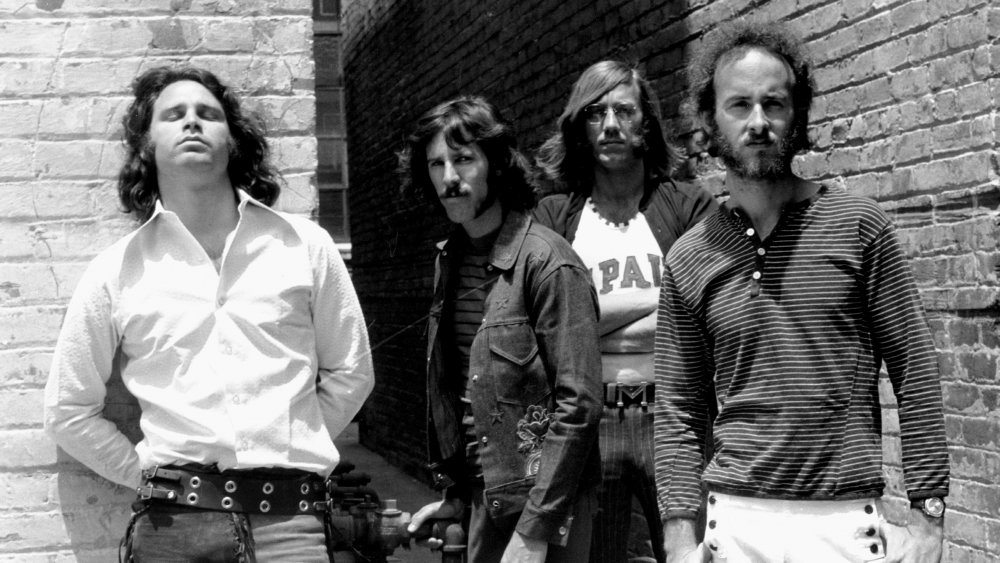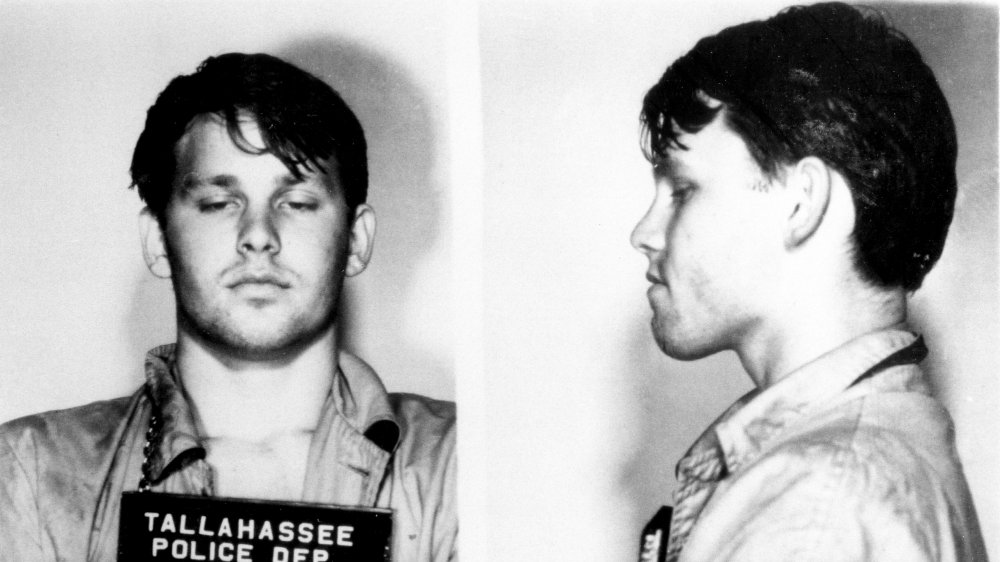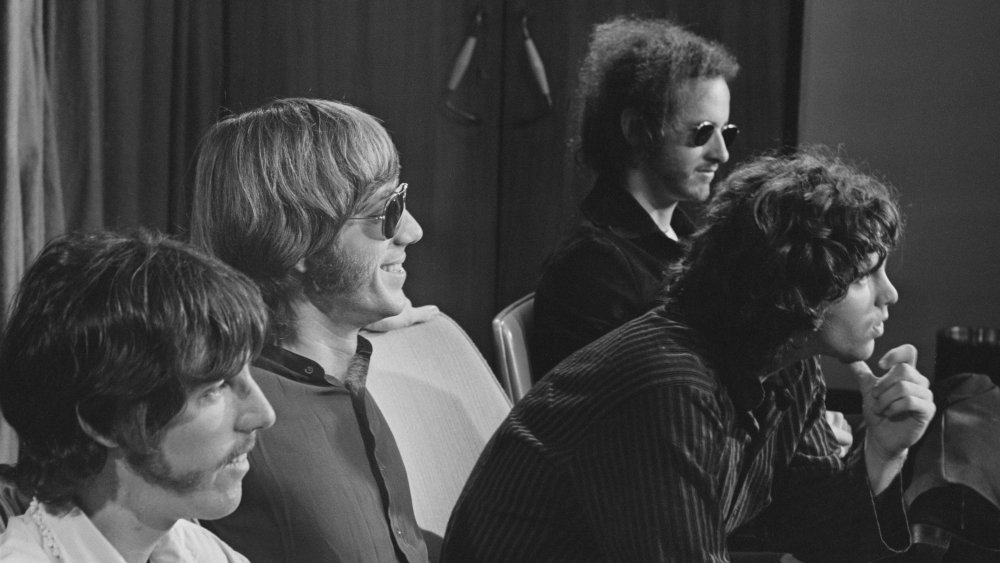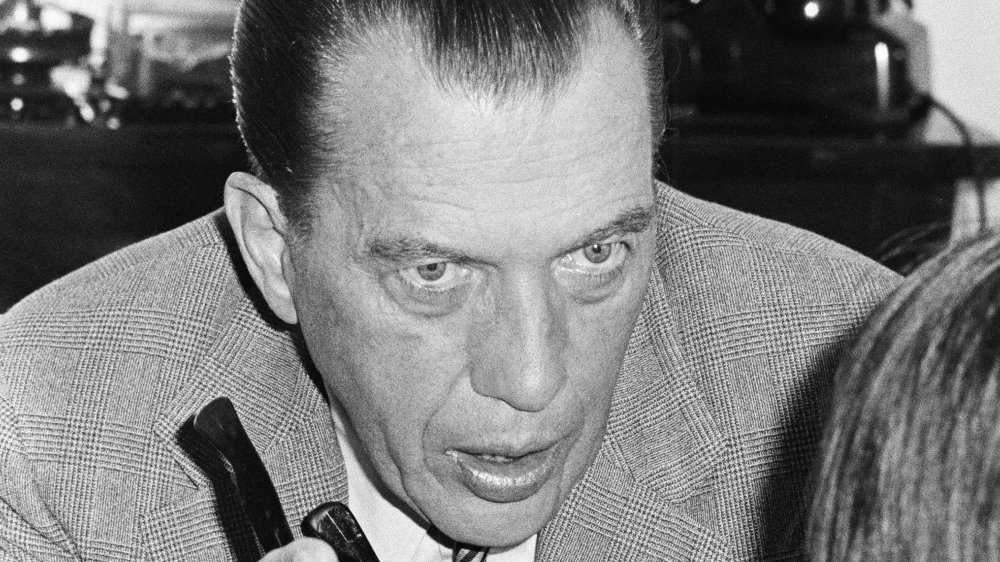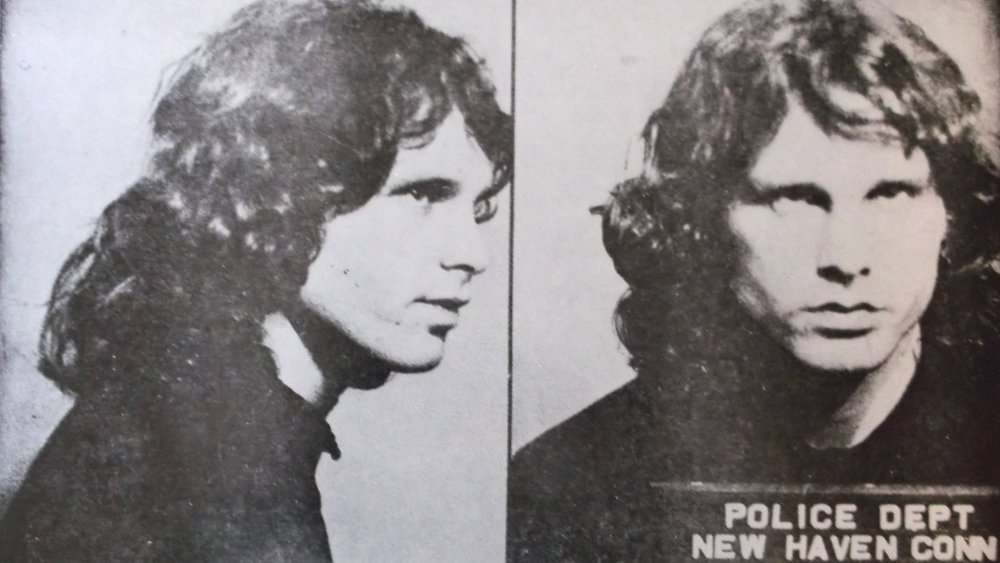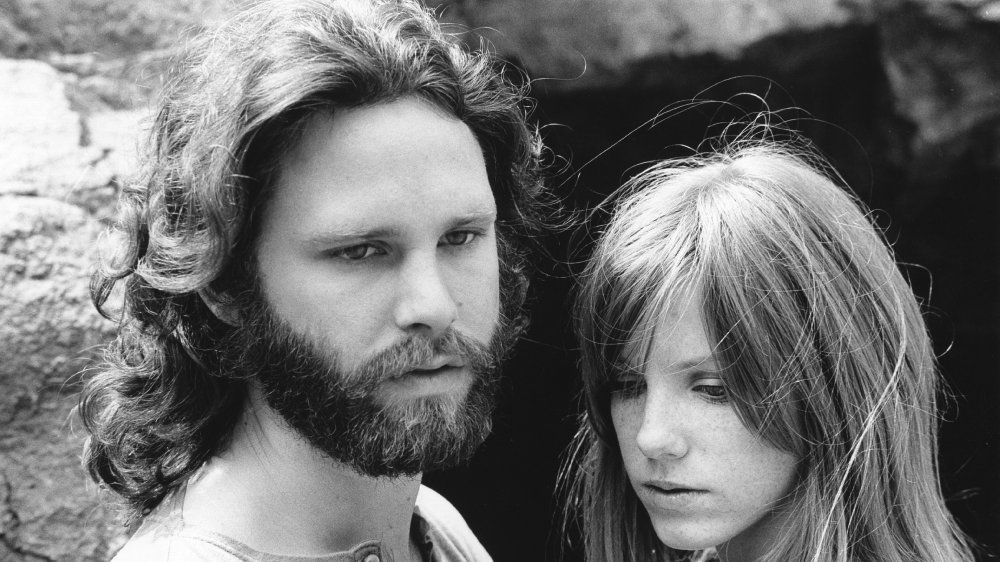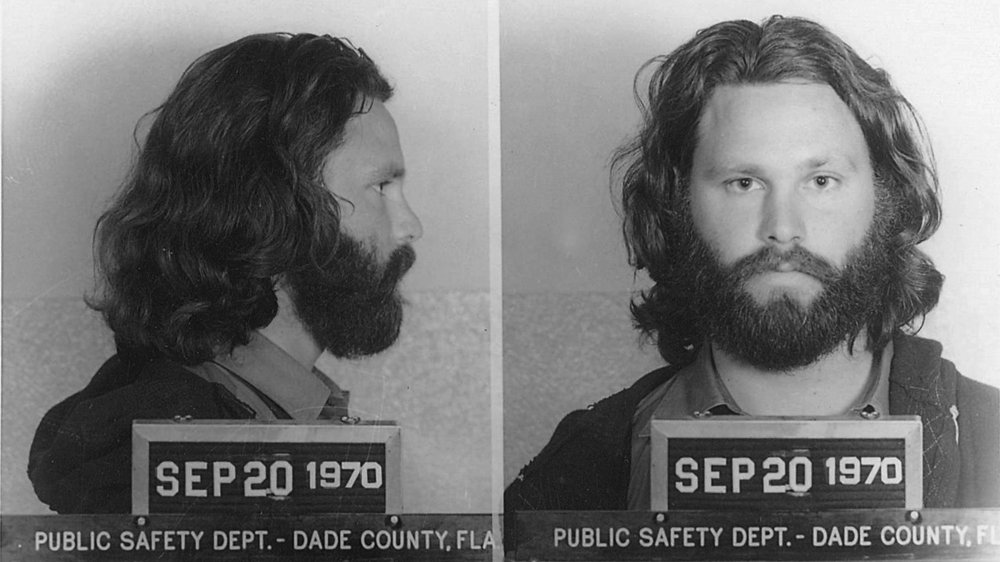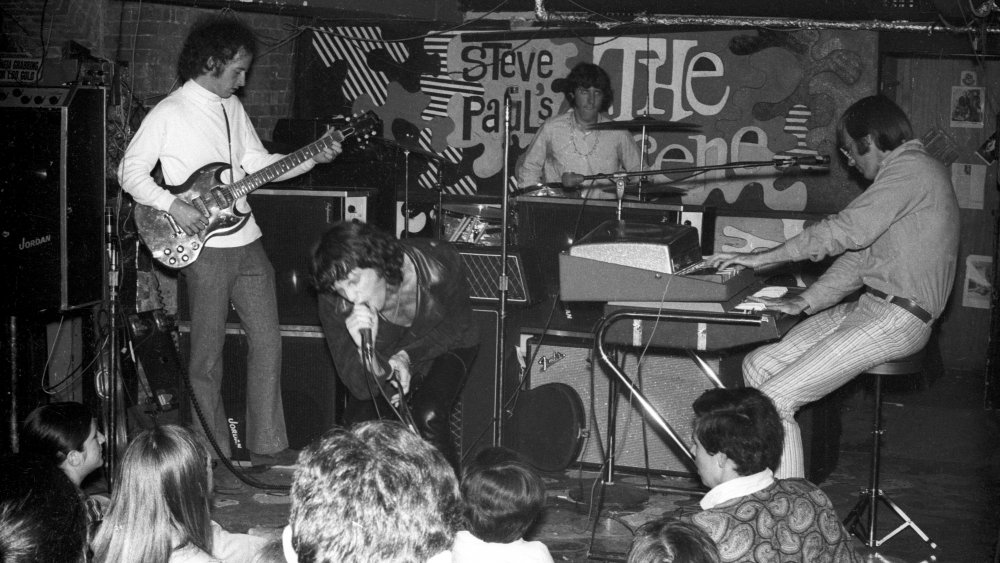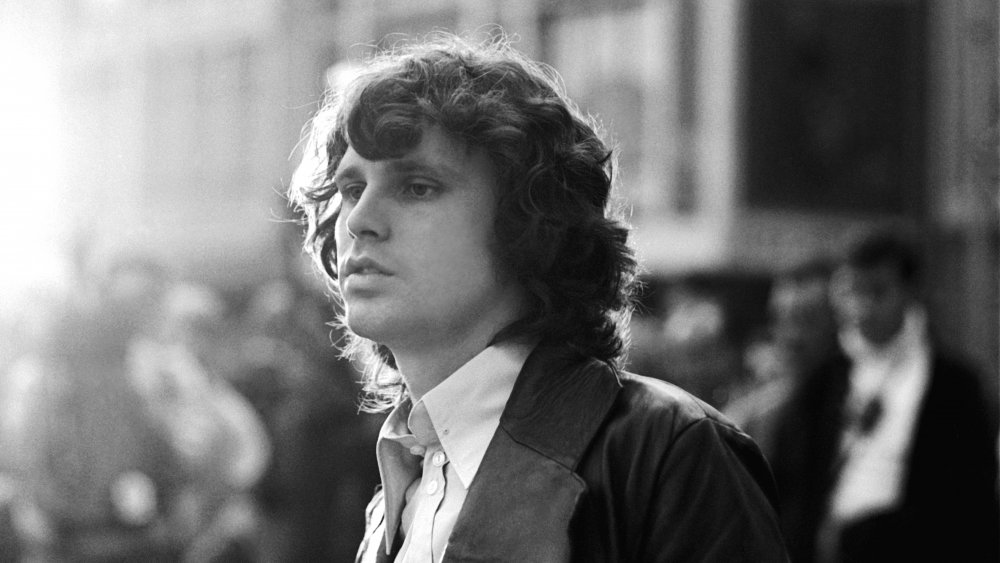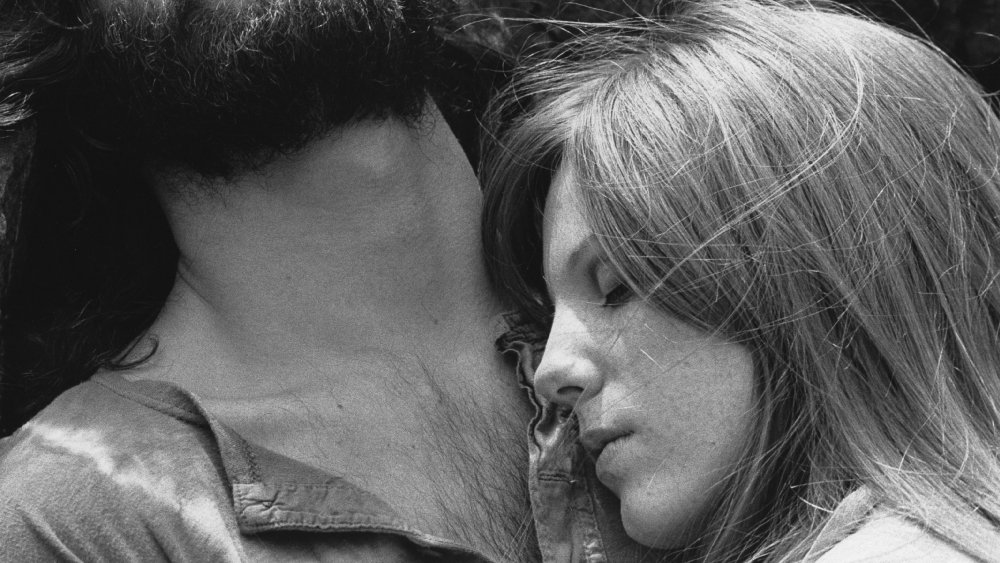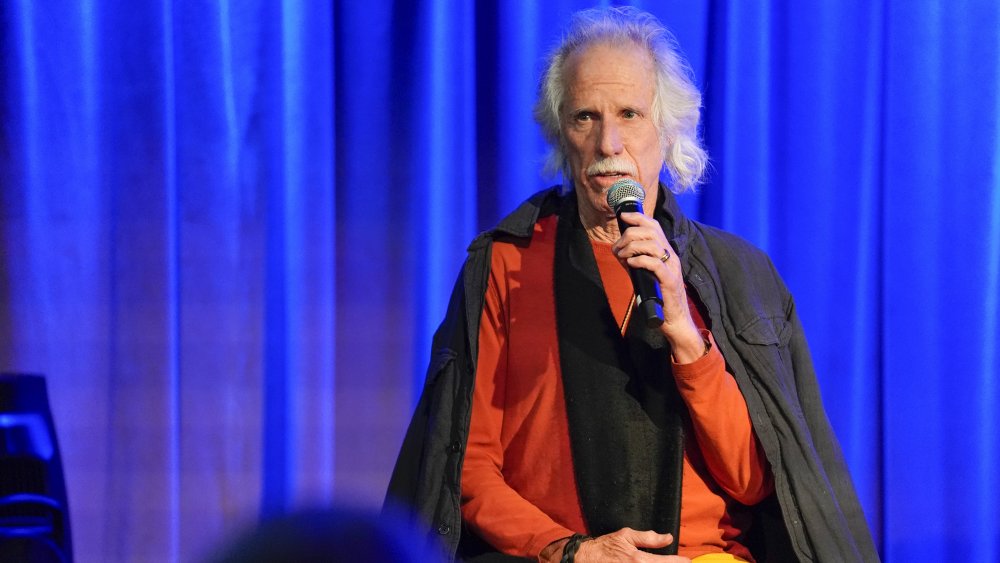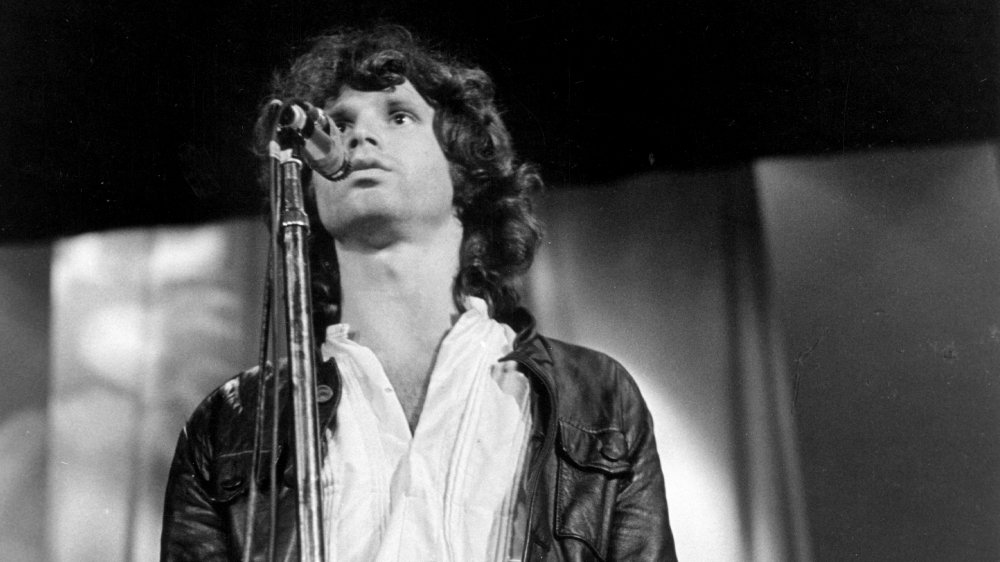The Tragic Real-Life Story Of The Doors
The mid-'60s marked a tectonic shift in the United States, a loud shot that split the decade down the middle from a growing social movement to full-scale social unrest and rioting throughout the nation. The escalating Vietnam War, the Civil Rights Movement, and a cultural overthrow of traditional norms had heated up by 1965 and would only get hotter as the decade continued.
That same year, two film students, one a recent graduate and the other a graduate student, met on the campus of UCLA. Eventually, they would leave film in favor of music, and by the end of the year, according to the University of California, the two students, Ray Manzarek and Jim Morrison, would be the keyboardist and frontman of a band that represented the overthrow of traditional Americana, the Doors.
The Doors helped establish the psychedelic era of music during the late 1960s and were part of a number of acts that made the West Coat the center of the music world. Jim Morrison became both a counterculture figure and a sex symbol, all while his deep, melodic voice sang some of the most recognizable songs in rock history. The Doors, though, like the era during which they played, were fraught with tension and destruction. This is the tragic real-life story of the Doors.
Jim Morrison's troubled youth
As the frontman and face of one of rock 'n' roll's most rebellious bands, Jim Morrison's upbringing would surprise people. Unlike rebels of the period such as John Lennon, Morrison grew up in a stable, two-parent home, and unlike Elvis Presley, he did not have to deal with the pains of poverty. James Douglas Morrison was born to Clara Clarke Morrison and George Stephen Morrison on December 8, 1943. His father was a naval aviator at the time and eventually earned the rank of rear admiral.
Early in Morrison's childhood, the boy who would eventually become known as "The Lizard King" would have a life-changing experience. According to Biography, while riding through the New Mexico desert at around age five, he saw the aftermath of a car accident and would later describe seeing the dead bodies of Native Americans on the side of the road. While his family members have said the accident was "exaggerated" by Morrison, the event had an altering effect on him. Morrison said of the incident: "That was the first time I tasted fear."
A studious student and heavy reader, Morrison began to rebel as he reached his teens. As reported by Ultimate Classic Rock, while attending Florida State University in 1963, a drunk Morrison was arrested for disturbing the peace during a football game. The next year, he would transfer to UCLA to study film.
The Doors get fired from the Whiskey A Go-Go
According to the Doors' official website, Morrison's poetry enamored Ray Manzarek enough to ask him to join his band, Rick and the Ravens, in 1965. By the next year, the core four members of the band were together: keyboardist Ray Manzarek, singer Jim Morrison, guitarist Robby Krieger, and drummer John Densmore. Krieger and Densmore had previously played together in the band Psychedelic Rangers.
After a four-month stint at the London Fog nightclub, the group obtained a residency at one of the biggest venues in all of Los Angeles, the Whiskey A Go-Go, in May 1966. During their residency, according to Waiting For The Sun, the Doors opened for some of the biggest acts of the era during this period, such as Buffalo Springfield, Them, and the Chamber Brothers.
In August 1966, the group signed with Elektra Records. In their first show at the Whiskey following this, LA Weekly reports that Morrison began to ad-lib during a song, something he would become famous for throughout his career. As the rest of the band continued to improvise along with Morrison's ad-libbing, the frontman started to belt out an explicit couplet relating to the famous play Oedipus Rex. Unsurprisingly, the band was fired after the show, and they would immediately go to work with Elektra Records to make their debut album.
Ed Sullivan bans the Doors after one performance
A common theme that can be seen with Jim Morrison and the Doors is a complete disregard for authority figures. This occurred multiple times before and after their lone appearance on The Ed Sullivan Show, the popular variety program that helped launched groups like the Rolling Stones, the Dave Clark Five, and many other musical acts.
Sullivan was no stranger to inviting controversial rock musicians on the show, such as when he hosted Elvis Presley back in 1956 and the Beatles in 1964, bringing Beatlemania to the United States, but Sullivan was still a far way from being as liberal with his show's performances as the Smothers Brothers. According to the official Ed Sullivan Show website, following the rehearsal, Sullivan told the band they were great but "ought to smile a little more." Afterward, as the band was in their dressing room, a producer came to ask them to change a lyric, "Girl, we couldn't get much higher," in their song, "Light My Fire," because it could be interpreted as referencing a drug high. While the band told the producer they would, Morrison adamantly told his bandmates he wouldn't change the lyric.
Morrison ignored Sullivan's request and sang the song unedited. After the show, the producers informed the Doors that they would not be allowed on the show again, to which Morrison replied, "Hey, man. We just did the Sullivan show."
The New Haven arrest
In a first in the young history of the rock 'n' roll genre, Jim Morrison was arrested onstage during a performance in New Haven, Connecticut, in 1967. Prior to the concert, Morrison was making out with a female fan and wasn't recognized by a police officer as the lead singer of the band that was about to perform. As told by Ray Manzarek (via Ultimate Classic Rock), when the officer told him to leave, Morrison replied, "Eat it." After a second warning and another defiant comment from the Lizard King, the officer maced Morrison.
The concert was delayed for Morrison to recover, and the officer apologized to the Doors' manager once he knew who he'd maced. An angry Morrison and the rest of the band proceeded with the show all according to plan ... until Morrison went on a tirade during the song "Back Door Man."
He referred to the cop who'd maced him as a "little blue pig" and warned the crowd, "I'm just like you guys, man — he did it to me, they'll do it to you." According to Today in Connecticut History, witnesses said Morrison was "very intoxicated." Eventually, the cops arrived and took Morrison into custody. A small riot ensued, which led to 13 more arrests and Morrison being charged with inciting a riot, indecency, and public obscenity. This would not be the last concert incident between Morrison and law enforcement.
Jim Morrison and Pamela Courson's Relationship
Jim Morrison was a sex symbol during the height of the "free love" era of the late 1960s (as evidenced by his activity with a fan before the New Haven incident). It's easy to forget that he actually had a partner throughout his career: Pamela Courson, who met Morrison at the London Fog when she was 19 and he was 22, according to Cultura Colectiva. They began dating in 1965, though the relationship was more like Sid and Nancy and Ike and Tina Turner than it was Ashford and Simpson. Drug use, infidelities, and rumored abuse were present during their entire six-year relationship, which concluded with Morrison's death.
Morrison had affairs with a number of high-profile women of the era, including Grace Slick of Jefferson Airplane (per Louder) and the singer Nico according to Waiting for the Sun. Famously, he and rock critic Patricia Kenneally performed a nontraditional Celtic Pagan marriage. Kenneally would add Morrison to her name to display their unconventional marriage. All of this occurred while he and Pamela Courson were still in a relationship. Cultura Colectiva reports that in one heated argument, Pamela hit Morrison and locked herself in a room (sometimes described as a closet), after which Morrison set the room on fire. Ray Manzarek, however, claimed this never happened. Still, the pair reconciled after every ugly episode.
The Miami arrest
While the New Haven incident could be chalked up as a case of Morrison lashing out in anger for what he believed was police misconduct, the same cannot be said of what happened in Miami in 1969. At this point, Morrison's alcohol consumption and musical experimentation had increased with his stardom. In a 1998 interview on the NPR program Fresh Air, Manzarek discussed what happened that night: "Jim has seen The Living Theater [a theater group that experimented with breaking down the fourth wall and confronting the audience] and he's going to do his version of The Living Theater. He's going to show these Florida people what psychedelic West Coast shamanism and confrontation is all about."
Early into the concert, Morrison began to taunt and shout profanities at the audience, removed his shirt, and pretended to perform an ... adult act on guitarist Robby Krieger. Concerning the long-held belief that Morrison removed his pants and exposed his privates, Manzarek said, "They hallucinated. I swear, the guy never did it. He never whipped it out."
A few days later, a warrant for Morrison was issued by the Dade County Sheriff's Office for lewd and lascivious behavior, indecent exposure, drunkenness, and profanity. According to History, almost all of the witnesses for the prosecution were "somehow connected to the police or the district attorney's office." Morrison turned down a plea deal to perform a free concert and was eventually convicted, fined $500, and sentenced to six months in prison.
Recording The Soft Parade
Just a few months following the Miami concert that ended in Morrison's arrest, the group's fourth studio album, The Soft Parade, was released. Despite its gentle title, the album was more like a loud grease fire that almost ended the band. Nevertheless, it still was a critical and commercial success, one that illustrated the phrase "art through adversity."
Ultimate Classic Rock reports that the album was experimental, leaving the Doors' psychedelic and blues influence for "orchestral and brass arrangements, a weird bluegrass-soul amalgam and a misguided attempt at prog."
Morrison continued to battle his own demons with alcohol and drug use, prompting Robby Krieger to take over much of the songwriting for the album, as well as to share vocals on the song "Runnin' Blue." Still, with all the chaos surrounding them, the album still had the Doors' third-highest hit single of their career, "Touch Me." Powered by that and the Doors' stardom, The Soft Parade went platinum. Still, the album failed to chart in the UK, and the band's final two albums as a foursome would rely on their blues and jazz influence with a psychedelic touch, as their previous albums had.
Jim Morrison joins the 27 Club
By the end of the 1960s and beginning of the 1970s, rock 'n' roll was losing some of its greatest artists and bands. 1970 itself saw the Beatles announcing their breakup April as well as the deaths of guitarist Jimi Hendrix and singer Janis Joplin within a three-week period. Both died at age 27.
Following the release of the Doors' sixth studio album, LA Woman, Morrison and Pamela Courson took a leave of absence in Paris. On July 3, 1971, Courson discovered her partner dead in their bathtub. According to Rolling Stone, the Doors' manager Bill Siddons did not let word about his death reach the American media until July 9, two days after his burial in Paris. Even today, Morrison's death is shrouded in mystery. No autopsy was performed, as Siddons said, "just because we didn't want to do it that way. We wanted to leave him alone. He died in peace and dignity."
The official death certificate said that Morrison died of a heart attack, while early news reports said that he died of pneumonia. Siddons said this about Morrison's death: "It was some sort of heart failure. Blood probably collected from a clot and worked its way up the chest and blocked heart valves. And that caused the heart attack." He also claimed that "physical abuse" had something to do with Morrison's death as well. How Jim Morrison died has been and will be debated for years.
Pamela Courson joins Jim Morrison
Pamela Courson, like her late partner, had many demons in the forms of drug addiction that troubled her life. In 1971, she was the one who discovered her husband dead in their Paris home. Following his death and funeral, Pamela moved back to the United States. She first lived with journalist Ellen Sander before moving in with her friend Diane Gardiner.
The Famous People reports that following Morrison's death, Pam was "devastated" and spent more of her time with the Golden Retriever, Sage, that she and Morrison shared. Unfortunately, she also continued her drug use.
On April 25, 1974, Courson died of a drug overdose in her Los Angeles apartment. Like her partner and many other musicians, she was 27 years old at the time of her death. She was buried under the name Pamela Courson Morrison in California, despite the efforts of her parents to have her buried next to Jim in Paris.
John Densmore vetoes the band's attempt to commercialize
Though Morrison was usually portrayed as the anti-corporate, anti-commercial artist in the band, he was far from the only one. Drummer John Densmore had just as strong a stance as Morrison against what he perceived as "selling out" or using the Doors' music for commercial products. Unfortunately, this led to court proceedings between Densmore and his surviving bandmates.
In a conversation with Rolling Stone, Densmore recalled when Morrison learned his bandmates were discussing taking a $75,000 deal to use their song, "Light My Fire" for a Buick ad in 1968: "Jim told us he couldn't trust us anymore. We had agreed that we would never use our music in any commercial, but the money Buick offered us had been hard to refuse. Jim accused us of making a deal with the devil and said he would smash a Buick with a sledgehammer onstage if we let them [change the lyrics]." (The ad would have had the lyric, "Come on Buick light my fire.")
In the early 2000s, Ray Manzarek and Robby Krieger attempted to rejuvenate the band, referring to their duo as "The Doors of the 21st Century." Densmore and the Morrison estate sued Manzarek and Krieger to prevent them from continuing to use the name. Densmore had also vetoed a $15 million deal to Cadillac so they could use the Doors' music, against the wishes of Krieger and Manzarek. According to The Guardian, Krieger and Manzarek attempted to paint Densmore as a communist, though they were unsuccessful, as Densmore won the case.
Ray Manzarek pans the Doors biopic
In 1991, Oliver Stone directed and co-wrote a biopic telling the Doors' story, starring Val Kilmer as Jim Morrison and Meg Ryan as Pamela Courson. Upon seeing the film, Ray Manzarek strongly condemned how his departed friend was portrayed. Manzarek told the LA Times, "Oliver Stone has assassinated Jim Morrison." He took issue with Morrison's portrayal as "a violent, drunken fool," and as he walked out, he asked himself, "Geez, who was that jerk?"
Manzarek also said that the film did not understand the "artistic vision" of his old band. "The film comes from the entirely wrong philosophical base. The Doors were about idealism and the '60s quest for freedom and brotherhood. But the film isn't based on love. It's based in madness and chaos. Oliver has made Jim into an agent of destruction." Much of Manzarek's "agent of destruction" description came from a few scenes from the film based on rumors of Morrison becoming violent toward his friends, rumors which were never proven and Manzarek claimed never happened: "Jim didn't light Pam's closet on fire. He didn't throw a TV set at me. His student film didn't have images from 'Triumph of the Will.' That was totally made up. And Jim never quit film school. He graduated from UCLA."
Unfortunately, (or fortunately, if you ask Manzarek) The Doors didn't make back its $38 million budget.
Ray Manzarek dies of cancer
After the death of Jim Morrison in 1971, the band would release three more albums of original material. The final, An American Prayer in 1978, featured Morrison's poetry. In 1993, the band was inducted into the Rock and Roll Hall of Fame. Taking the place of Morrison during their performance was Pearl Jam frontman Eddie Vedder.
In March 2013, Ray Manzarek was diagnosed with cholangiocarcinoma, a rare duct bile cancer. According to Medical Net, this type of cancer affects fewer than 4,000 people in the United States on a yearly basis. On May 23, 2013, Manzarek passed away in Rosenheim, Germany, survived by his wife of 36 years Dorothy, their son Pablo, and four grandchildren. Robbie Krieger told Rolling Stone shortly after the passing, "I'm just glad to have been able to have played Doors songs with him for the last decade. Ray was a huge part of my life and I will always miss him."
A documentary, Break on Thru — A Celebration of Ray Manzarek, was played in theaters on February 12, 2020, Manzarek's birthday. The documentary also contained footage from a 2016 concert at the Ford Theater in Los Angeles in which Krieger and Densmore, the two surviving members of the band, performed together for the first time in 15 years, according to Ultimate Classic Rock.
